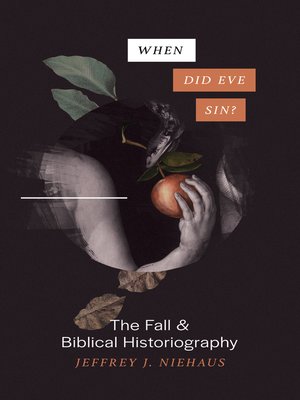
Sign up to save your library
With an OverDrive account, you can save your favorite libraries for at-a-glance information about availability. Find out more about OverDrive accounts.
Find this title in Libby, the library reading app by OverDrive.



Search for a digital library with this title
Title found at these libraries:
| Library Name | Distance |
|---|---|
| Loading... |
Did Eve sin before Adam?
When responding to the serpent's temptation to eat the forbidden fruit, Eve says that one "must not touch it" (Gen 3:2–3). In this, Eve appears to embellish upon God's clear command that one must not eat from the tree (Gen 2:17). Did Eve add to God's command, becoming the first legalist? Was this an innocent mistake? Or is the answer altogether different?
Jeffrey J. Niehaus tackles this issue head-on in When Did Eve Sin? Though many commentators believe that Eve altered God's command, there are notable exceptions in the history of interpretation that suggest another answer. Using Scripture to interpret Scripture and analyzing biblical stories where characters retell the facts, Neihaus recognizes a common scriptural pattern that resolves the mystery of Eve's words.
Niehaus examines his view's implications for biblical historiography, what it meant to eat from the tree of life, how a sinless being can fall into sin, and the nature of the mysterious serpent. Everyone engaging with these questions will be deftly guided by Niehaus' thorough study of this thorny issue.
When responding to the serpent's temptation to eat the forbidden fruit, Eve says that one "must not touch it" (Gen 3:2–3). In this, Eve appears to embellish upon God's clear command that one must not eat from the tree (Gen 2:17). Did Eve add to God's command, becoming the first legalist? Was this an innocent mistake? Or is the answer altogether different?
Jeffrey J. Niehaus tackles this issue head-on in When Did Eve Sin? Though many commentators believe that Eve altered God's command, there are notable exceptions in the history of interpretation that suggest another answer. Using Scripture to interpret Scripture and analyzing biblical stories where characters retell the facts, Neihaus recognizes a common scriptural pattern that resolves the mystery of Eve's words.
Niehaus examines his view's implications for biblical historiography, what it meant to eat from the tree of life, how a sinless being can fall into sin, and the nature of the mysterious serpent. Everyone engaging with these questions will be deftly guided by Niehaus' thorough study of this thorny issue.







